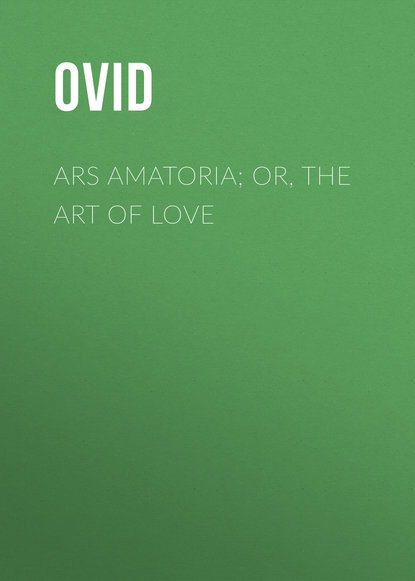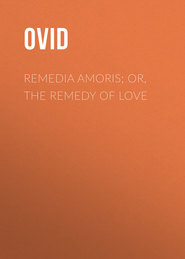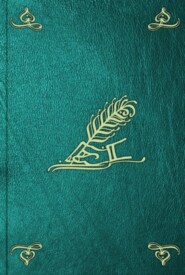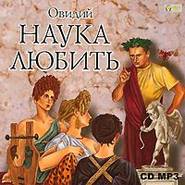По всем вопросам обращайтесь на: info@litportal.ru
(©) 2003-2024.
✖
Ars Amatoria; or, The Art Of Love
Настройки чтения
Размер шрифта
Высота строк
Поля
Ah pudet! arcanas pars habet ista notas.
Gaudia post Yeneris quæ poscet munus amantem,
Ipsa suas nolet pondus habere preces.
And admit not the light in your chamber with the windows wide open; many blemishes of your person more becomingly lie concealed.
My pastime draws to a close; 'tis time to descend from the swans, 1128 (#x6_x_6_i380) that have borne my yoke upon their necks. As once the youths did, so now the fair, as my audience, may inscribe, "Naso was our preceptor," upon their spoils.
FOOTNOTES BOOK ONE
701 (return (#x1_x_1_i31))
[ For stripes.—Ver. 16. Statius, in the Thebaid, mentions the strictness of the discipline of Chiron. See the Amores, i. El. xiii. 1. 18.]
702 (return (#x1_x_1_i32))
[ Be ye afar.—Ver. 31. He quotes this and the following line in the Tristia, Book ii. 1. 248, to show that it was not his intention, by his precepts, to inculcate breaches of chastity among the Roman matrons. See the Note to the passage, and to the Fasti, Book ii. 1. 30. The 'vitta,' or 'fillet,' was worn solely by women of pure character.]
703 (return (#x1_x_1_i35))
[ The tawny Indians.—Ver. 53. Herodotus considers the Æthiopians to be Indians. According to some, the father of Andromeda was king of Ethiopia; but she is more frequently represented as a native of Joppa, on the coast of Syria.]
704 (return (#x1_x_1_i35))
[ As many stars as.—Ver. 59. Heinsius considers this and the next line to be spurious.]
705 (return (#x1_x_1_i35))
[ Wish a riper fair.—Ver. 63. 'Juvenis,' applied to a female, would mean something more than a mere girl. 'Juventus' was that age in which a person was in his best years, from about twenty to forty.]
706 (return (#x1_x_1_i36))
[ Pompey's Portico.—Ver. 67. He alludes to the Portico which had been erected by Pompey at Rome, and was shaded by plane trees and refreshed by fountains. The Porticos were walks covered with roofs, supported by columns. They were sometimes attached to other buildings, and sometimes were independent of any other edifice. They were much resorted to by those who wished to take exercise without exposure to the heat of the sun. The Porticos of the temples were originally intended for the resort of persons who took part in the rites performed there. Lawsuits were sometimes conducted in the Porticos of Rome, and goods were sold there.]
707 (return (#x1_x_1_i36))
[ The lion of Hercules.il—Ver. 68. The Nemean lion; which formed the Constellation Leo in the Zodiac.]
708 (return (#x1_x_1_i36))
[ Where the mother.—Ver. 69. He alludes to the Theatre and Portico which Augustus built; the former of which received the name of his nephew Marcellus, the latter of his sister Octavia, the mother of Marcellus. After the death of Marcellus, Octavia added a public library to this Portico at her own expense. Here there were valuable paintings of Minerva, Philip and Alexander, and Hercules on Mount Aeta. Some suppose that the temple of Concord, built by Livia, and mentioned in the Fasti, is here referred to.]
709 (return (#x1_x_1_i36))
[ The Portico of Livia.—Ver. 72. The Portico of Livia was near the street called Suburra. This Portico is also mentioned in the Fasti. We learn from Strabo that it was near the Via Sacra, or Sacred Street.]
710 (return (#x1_x_1_i36))
[ Granddaughters of Belus.—Ver. 73. This was the Portico of the Danaides, in the temple of Apollo. It is referred to in the Second Elegy of the Second Book of the Amores.]
711 (return (#x1_x_1_i36))
[ Bewailed by Venus.—Ver. 75. He alludes to the temple of Venus, at Rome, which, according to Juvenal, was notorious as the scene of intrigues and disgraceful irregularities. It was a custom of the Romans, borrowed from the Assyrians, to lament Adonis in the temple of Venus. See the Tenth Book of the Metamorphoses. This worship of the Assyrians is mentioned by the Prophet Ezekiel, chap. viii. ver. 13, 'women weeping for Thatnmuz.']
712 (return (#x1_x_1_i36))
[ The Jew of Syria.—Ver. 76. He alludes to the rites performed in the Synagogues of the Jews of Rome, on the Sabbath, to which numbers or females were attracted, probably by the music. There were great numbers of Jews at Rome in the reign of Augustus, who were allowed to follow their own worship, according to the law of Moses. The Roman females visiting the Synagogues, assignations and gross irregularities became the consequence. Tiberius withdrew this privilege from the Jews, and ordered the priests' vestments and ornaments to be burnt. This line is thus rendered in Dryden's version:
'Nor shun the Jewish walk, where the foul drove,
On Sabbaths rest from everything but love.'
This wretched paraphrase is excused by the following very illiberal note,
'If this version seems to bear a little hard on the ancient Jews, it does not at all wrong the modern.']
713 (return (#x1_x_1_i36))
[ Many a woman.—Ver. 78. Io, or Isis, was debauched by Jupiter. Martial and Juvenal speak of the irregularities practised on these occasions.]
714 (return (#x1_x_1_i36))
[ Where the erection.—Ver. 81. He refers to the Forum of Cæsar and the temple of Venus, which was built by Julius Cæsar after the battle of Pharsalia.]
715 (return (#x1_x_1_i36))
[ Of Appius.—Ver. 82. He alludes to the aqueduct which had been constructed by the Censor Appius. This passed into the City, through the Latin gate, and discharged itself near the spot where the temple of Venus was built.]
716 (return (#x1_x_1_i36))
[ Shooting stream.—Ver. 82; He alludes to the violence with which the water was discharged by the pipes of the aqueduct into the reservoir.]
717 (return (#x1_x_1_i36))
[ Which is adjoining.—Ver. 87. The temple of Venus was near the Forum.]
718 (return (#x1_x_1_i38))
[ Ravished Sabine fair.—Ver. 102. See the Fasti, Book iii. 1. 199.]
719 (return (#x1_x_1_i38))
[ Neither did curtains.—Ver. 103. The 'vela,' here referred to, may mean either the 'siparia,' or curtains of the theatres, or the awnings which were hung over them. See the Note on the 'siparia' of the theatres, referred to in the Third Book of the Metamorphoses, L 111. The 'velaria,' or 'awnings,' were stretched over the whole space of the theatres, to protect the spectators from the sun and rain.]
720 (return (#x1_x_1_i38))
[ Marble theatre.—Ver. 103. The Theatres of Pompey and Scaurus were of marble.]
721 (return (#x1_x_1_i38))
Gaudia post Yeneris quæ poscet munus amantem,
Ipsa suas nolet pondus habere preces.
And admit not the light in your chamber with the windows wide open; many blemishes of your person more becomingly lie concealed.
My pastime draws to a close; 'tis time to descend from the swans, 1128 (#x6_x_6_i380) that have borne my yoke upon their necks. As once the youths did, so now the fair, as my audience, may inscribe, "Naso was our preceptor," upon their spoils.
FOOTNOTES BOOK ONE
701 (return (#x1_x_1_i31))
[ For stripes.—Ver. 16. Statius, in the Thebaid, mentions the strictness of the discipline of Chiron. See the Amores, i. El. xiii. 1. 18.]
702 (return (#x1_x_1_i32))
[ Be ye afar.—Ver. 31. He quotes this and the following line in the Tristia, Book ii. 1. 248, to show that it was not his intention, by his precepts, to inculcate breaches of chastity among the Roman matrons. See the Note to the passage, and to the Fasti, Book ii. 1. 30. The 'vitta,' or 'fillet,' was worn solely by women of pure character.]
703 (return (#x1_x_1_i35))
[ The tawny Indians.—Ver. 53. Herodotus considers the Æthiopians to be Indians. According to some, the father of Andromeda was king of Ethiopia; but she is more frequently represented as a native of Joppa, on the coast of Syria.]
704 (return (#x1_x_1_i35))
[ As many stars as.—Ver. 59. Heinsius considers this and the next line to be spurious.]
705 (return (#x1_x_1_i35))
[ Wish a riper fair.—Ver. 63. 'Juvenis,' applied to a female, would mean something more than a mere girl. 'Juventus' was that age in which a person was in his best years, from about twenty to forty.]
706 (return (#x1_x_1_i36))
[ Pompey's Portico.—Ver. 67. He alludes to the Portico which had been erected by Pompey at Rome, and was shaded by plane trees and refreshed by fountains. The Porticos were walks covered with roofs, supported by columns. They were sometimes attached to other buildings, and sometimes were independent of any other edifice. They were much resorted to by those who wished to take exercise without exposure to the heat of the sun. The Porticos of the temples were originally intended for the resort of persons who took part in the rites performed there. Lawsuits were sometimes conducted in the Porticos of Rome, and goods were sold there.]
707 (return (#x1_x_1_i36))
[ The lion of Hercules.il—Ver. 68. The Nemean lion; which formed the Constellation Leo in the Zodiac.]
708 (return (#x1_x_1_i36))
[ Where the mother.—Ver. 69. He alludes to the Theatre and Portico which Augustus built; the former of which received the name of his nephew Marcellus, the latter of his sister Octavia, the mother of Marcellus. After the death of Marcellus, Octavia added a public library to this Portico at her own expense. Here there were valuable paintings of Minerva, Philip and Alexander, and Hercules on Mount Aeta. Some suppose that the temple of Concord, built by Livia, and mentioned in the Fasti, is here referred to.]
709 (return (#x1_x_1_i36))
[ The Portico of Livia.—Ver. 72. The Portico of Livia was near the street called Suburra. This Portico is also mentioned in the Fasti. We learn from Strabo that it was near the Via Sacra, or Sacred Street.]
710 (return (#x1_x_1_i36))
[ Granddaughters of Belus.—Ver. 73. This was the Portico of the Danaides, in the temple of Apollo. It is referred to in the Second Elegy of the Second Book of the Amores.]
711 (return (#x1_x_1_i36))
[ Bewailed by Venus.—Ver. 75. He alludes to the temple of Venus, at Rome, which, according to Juvenal, was notorious as the scene of intrigues and disgraceful irregularities. It was a custom of the Romans, borrowed from the Assyrians, to lament Adonis in the temple of Venus. See the Tenth Book of the Metamorphoses. This worship of the Assyrians is mentioned by the Prophet Ezekiel, chap. viii. ver. 13, 'women weeping for Thatnmuz.']
712 (return (#x1_x_1_i36))
[ The Jew of Syria.—Ver. 76. He alludes to the rites performed in the Synagogues of the Jews of Rome, on the Sabbath, to which numbers or females were attracted, probably by the music. There were great numbers of Jews at Rome in the reign of Augustus, who were allowed to follow their own worship, according to the law of Moses. The Roman females visiting the Synagogues, assignations and gross irregularities became the consequence. Tiberius withdrew this privilege from the Jews, and ordered the priests' vestments and ornaments to be burnt. This line is thus rendered in Dryden's version:
'Nor shun the Jewish walk, where the foul drove,
On Sabbaths rest from everything but love.'
This wretched paraphrase is excused by the following very illiberal note,
'If this version seems to bear a little hard on the ancient Jews, it does not at all wrong the modern.']
713 (return (#x1_x_1_i36))
[ Many a woman.—Ver. 78. Io, or Isis, was debauched by Jupiter. Martial and Juvenal speak of the irregularities practised on these occasions.]
714 (return (#x1_x_1_i36))
[ Where the erection.—Ver. 81. He refers to the Forum of Cæsar and the temple of Venus, which was built by Julius Cæsar after the battle of Pharsalia.]
715 (return (#x1_x_1_i36))
[ Of Appius.—Ver. 82. He alludes to the aqueduct which had been constructed by the Censor Appius. This passed into the City, through the Latin gate, and discharged itself near the spot where the temple of Venus was built.]
716 (return (#x1_x_1_i36))
[ Shooting stream.—Ver. 82; He alludes to the violence with which the water was discharged by the pipes of the aqueduct into the reservoir.]
717 (return (#x1_x_1_i36))
[ Which is adjoining.—Ver. 87. The temple of Venus was near the Forum.]
718 (return (#x1_x_1_i38))
[ Ravished Sabine fair.—Ver. 102. See the Fasti, Book iii. 1. 199.]
719 (return (#x1_x_1_i38))
[ Neither did curtains.—Ver. 103. The 'vela,' here referred to, may mean either the 'siparia,' or curtains of the theatres, or the awnings which were hung over them. See the Note on the 'siparia' of the theatres, referred to in the Third Book of the Metamorphoses, L 111. The 'velaria,' or 'awnings,' were stretched over the whole space of the theatres, to protect the spectators from the sun and rain.]
720 (return (#x1_x_1_i38))
[ Marble theatre.—Ver. 103. The Theatres of Pompey and Scaurus were of marble.]
721 (return (#x1_x_1_i38))














